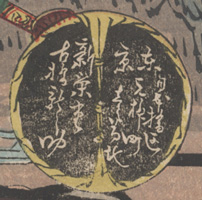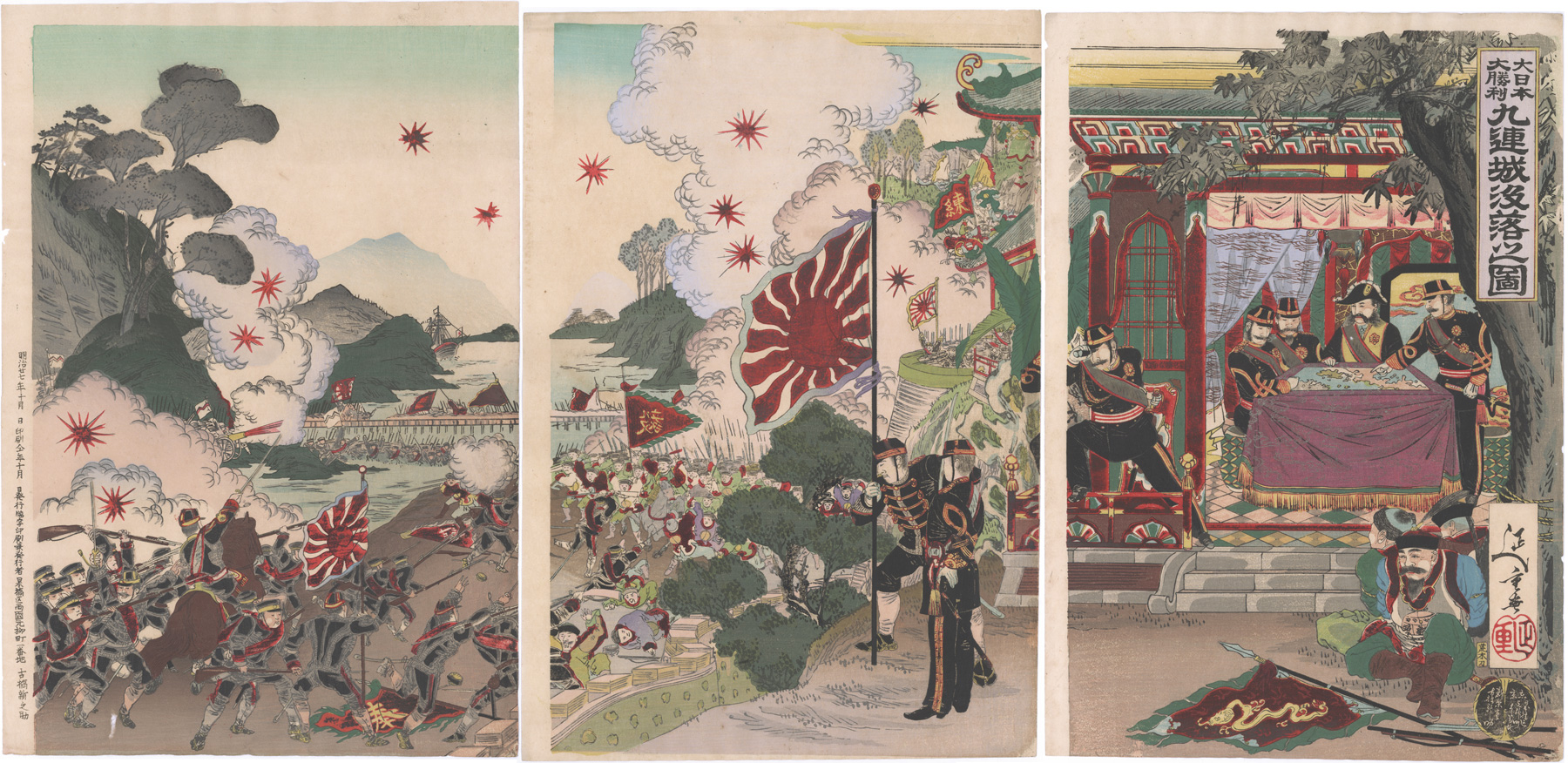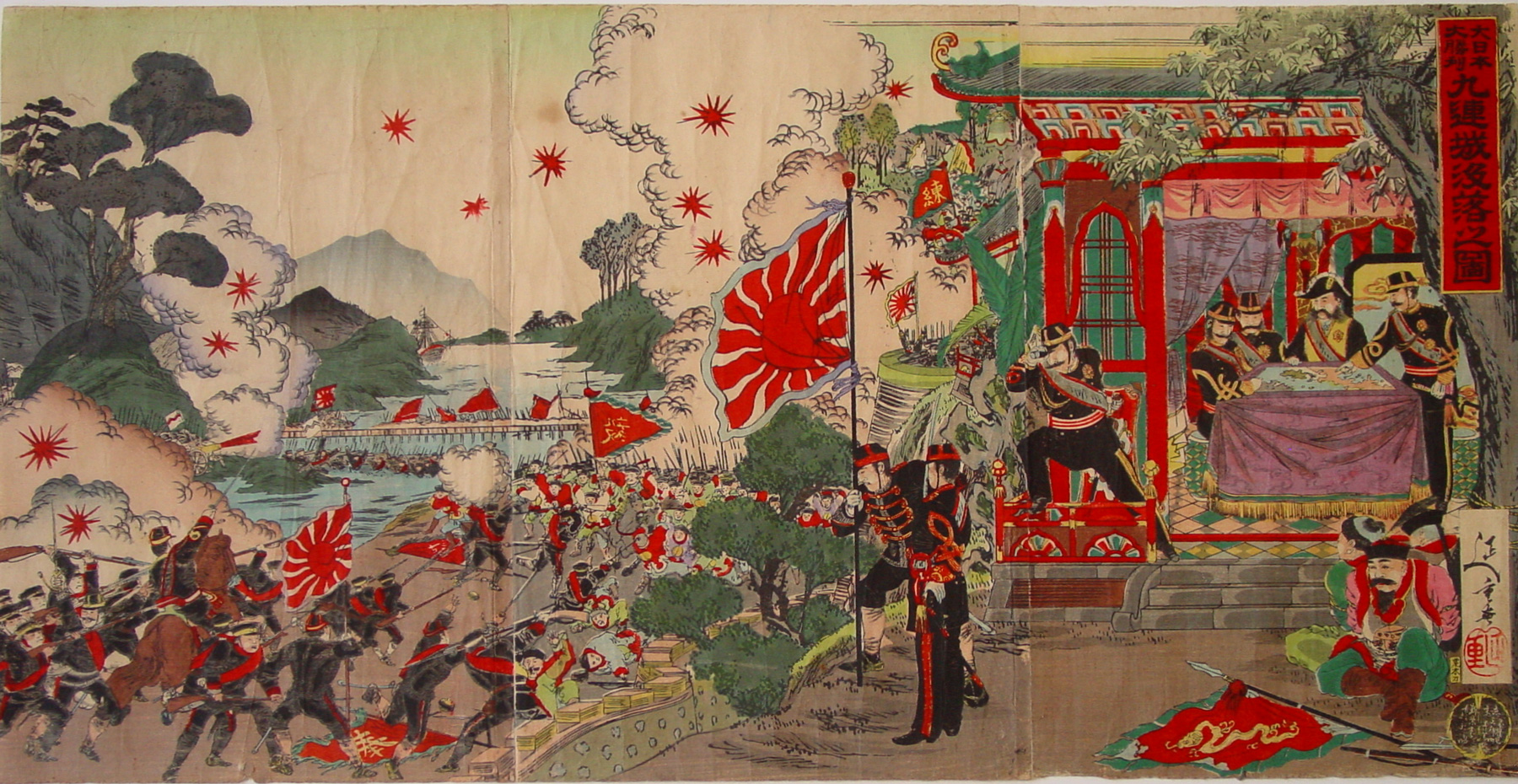About This Print
Two variations of the same print portraying a fictional battle for Kiuliencheng1 in Manchuria which was taken without opposition by the Japanese in late October 1894.
For other depictions of this battle see Valiant Battle at Kiuliencheng and A Great Victory of Our Forces at Kiuliencheng.
Source: Impressions of the Front: Woodcuts of the Sino-Japanese War, Shunpei Okamoto, Philadelphia Museum of Art, 1983, p. 30.
"As the Japanese penetrated Manchuria, they prepared for a full-scale assault on the Chinese defense, then centered at Kiuliencheng. War correspondent Kubota Beisen (1852-1906) reported on the Japanese conquest of Kiuliencheng: 'It was decided to attack Kiuliencheng on October 26. So the night before, the various troops were given their orders. Near dawn, the company I followed began marching. The fine weather had changed for the worse as a heavy mist rolled over the area. One could not see his hand before his eyes. The cover of mist hid our troops, certainly an act of divine assistance!
Soon we heard from the commander, Lieutenant General Nozu Michitsura, that Kuliencheng had already fallen. The citadel was immense, with ramparts of one square li [about one-third square mile], armed with cannons every three to four hundred meters. Inside were nine barracks which could house five thousand troops. That night the First Army's command post was established inside the citadel.'
Despite the battle scenes presented in [this] print, the Chinese had withdrawn from Kiuliencheng and the fortress was conquered virtually without fighting."
Unknown Seal
 | This unread seal, in the shape of a baren, appears beneath the artist's signature cartouche on the bottom right corner of the right panel. |
1 Kiuliencheng 九連城 is also referred to as Jiuliancheng or Kyūrenjō
Print Details
| IHL Catalog | #350; #1358 |
| Title or Description | Japanese Forces Conquer Kiuliencheng (Jiuliancheng) Dai Nihon daishōri Kyūrenjō botsuraku no zu 大日本大勝利九連城没落之図 |
| Artist | Yōsai Nobushige (active 1894-95) |
| Signature |  |
| Seal | Nobushige 延重 (see above) |
| Publication Date | October 1894 (Meiji 27) |
| Publisher |  [as printed in the bottom left margin of IHL Cat. #1358] |
| Carver |  |
| Impression | IHL Cat. #350: excellent IHL Cat. #1358: excellent |
| Colors | IHL Cat. #350: excellent IHL Cat. #1358: excellent |
| Condition | IHL Cat. #350: fair - trimmed to image, three sheets joined, wrinkling throughout and some soiling, bottom margin frayed; not backed IHL Cat. #1358: good - three separate sheets; almost full-size with margins in tact; some handling creases and light soiling |
| Genre | ukiyo-e; senso-e (Sino-Japanese War) |
| Miscellaneous | |
| Format | vertical oban triptych |
| H x W Paper | IHL Cat. #350: 14 x 27 3/4 in. (35.6 x 70.54 cm) IHL Cat. #1358: 14 1/2 x 9 15/16 in. (36.8 x 25.2 cm) approx. each sheet |
| H x W Image | IHL Cat. #350: same as paper size IHL Cat. #1358: 14 1/16 x 9 5/16 in. (35.7 x 23.7 cm.) approx. for each sheet |
| Literature | Impressions of the Front: Woodcuts of the Sino-Japanese War, Shunpei Okamoto, Philadelphia Museum of Art, 1983, p. 30. pl. 37 |
| Collections This Print | Philadelphia Museum of Art 1976-75-182; Shizuoka Prefectural Central Library K915-108-050-019; British Library shelfmark 16126.d.1(36); Saint Lous Art Museum 299:2010a-c |



